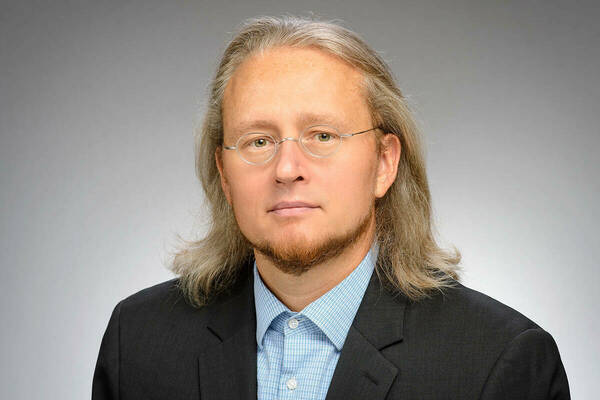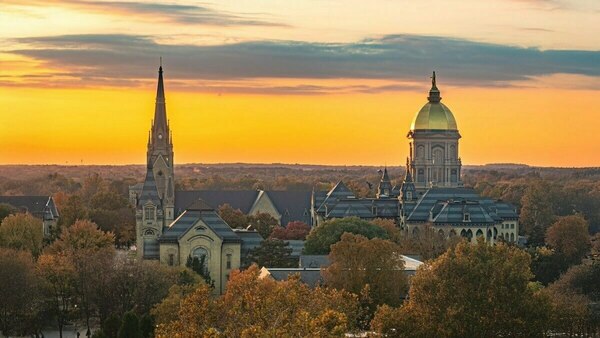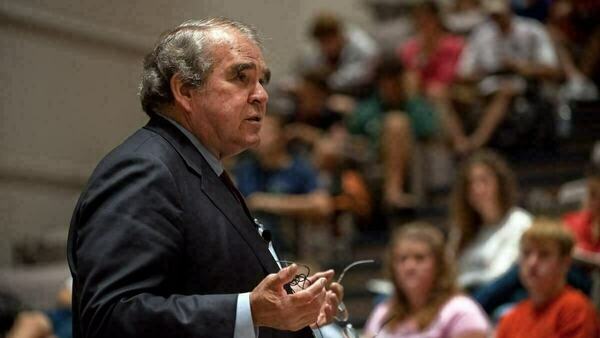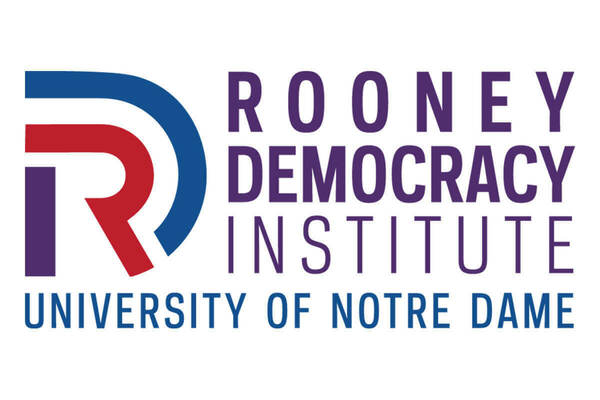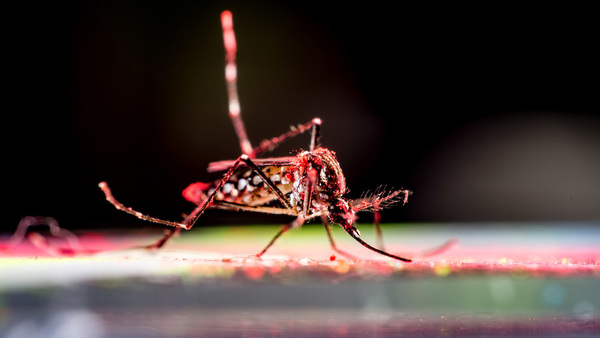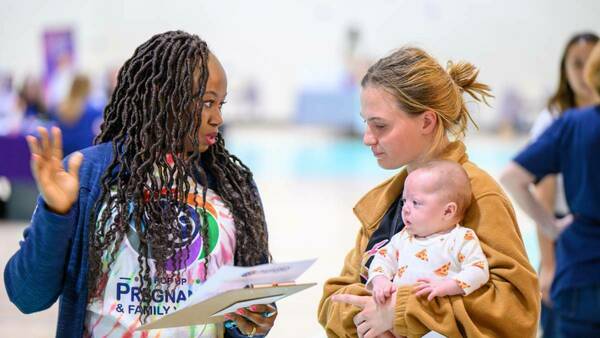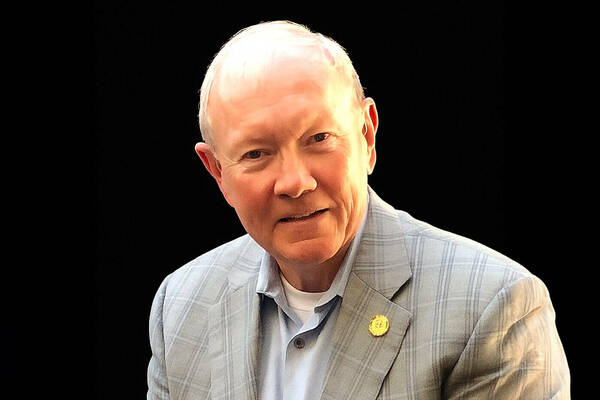In new research, Roy Scranton explores climate change and the limits of human progress
According to Roy Scranton, director of the University of Notre Dame’s Environmental Humanities Initiative, the biggest problem we face with climate change isn’t excessive carbon emissions or energy usage. And it isn’t the fundamental imbalance created by human activities that threatens ecosystems and has pushed the planet into instability.
The deeper problem, he argues, lies in the complexity of civilization itself — a global industrial society that has grown both unsustainably expensive and dangerously vulnerable to the environmental stresses that accompany climate change.
Because of this, he says, humanity is at an impasse.
That impasse is the foundation of Scranton’s latest research into what he sees as an intractable predicament where every fix faces potentially insurmountable challenges, from inertia and opposition to resource limits and competing priorities.

In his most recent book, “Impasse: Climate Change and the Limits of Progress,” Scranton, an associate professor of English, defines the impasse he sees as “not only political and institutional, but cognitive, existential and narrative” and asserts that the only path forward is through embracing what he terms ethical pessimism.
“A lot of people confuse pessimism with nihilism, apathy and despair,” Scranton said. “But pessimism is actually about recognizing our limits, letting go of unrealistic goals, finding solidarity in the fact of human suffering and doing what you can now, not in some utopian future.
“Modern pessimism emerged as a skeptical critique of early Enlightenment hubris, but it has roots in ancient wisdom from Sophocles to the Bhagavad Gita. Both the history of philosophy and modern insights from psychology show that pessimism is not only an effective way to deal with big problems, but a healthy approach to the unpredictability of circumstance, especially in fraught and difficult times.”
In “Impasse,” Scranton examines the “myth of progress,” how cultures have navigated societal collapse, failures in climate change communication, political extremism and “the end of the world as we know it,” ultimately concluding that the situation does not seem to be comprehensible within progressive modernity.
“These conclusions lead to a paradoxical and perilous ethical precipice,” he writes in the book. “The only way to cross the gap between progressive carbon-capitalist modernity and whatever comes next is to make a leap of faith, committing ourselves to an unknowable future.”
The second half of the book explores the origins of optimism and pessimism as both dimensions of personality and cognitive strategies, citing evidence from philosophy to neuroscience, as Scranton makes his case for ethical pessimism.
Our bias toward optimism, he cautions, may be “a characteristic of great evolutionary advantage of the long term, but under conditions of global ecological catastrophe has proven highly maladaptive.”
Pessimism, he concludes, is “an accurate, appropriate, and above all ethical response to the current situation — perhaps the only ethical response available.”
“Pessimism is fundamentally about recognizing and living within natural human limits,” Scranton writes. “It’s about recognizing that suffering is inevitable but not unbearable. It’s about learning to die and learning to live with death. And finally, it’s about committing to a radical and paradoxical hope: the hope that life might be worth living after the end of the world.”
Contact: Carrie Gates, associate director of media relations, 574-993-9220, c.gates@nd.edu
Latest ND NewsWire
- Notre Dame’s Kellogg Institute partners with Vanderbilt University to launch 2025-26 democracy surveyThe University of Notre Dame’s Kellogg Institute for International Studies and Vanderbilt University’s Center for Global Democracy are partnering to advance one of the world’s leading surveys on attitudes toward democracy. Starting in October, the Center for Global Democracy, with support from the Kellogg Institute, will conduct the 2025-26 round of the AmericasBarometer, which tracks public opinion on democracy in 20 countries across the Americas.
- Notre Dame to award 2026 Evangelium Vitae Medal to Wm. David Solomon, founding director of the de Nicola Center for Ethics and CultureThe de Nicola Center for Ethics and Culture at the University of Notre Dame announced that the late Wm. David Solomon, associate professor of philosophy emeritus and founding director of the center, has been named the recipient of the 15th annual Notre Dame Evangelium Vitae Medal, the nation’s most important award for heroes of the pro-life movement. The medal will be presented to Solomon’s family at a special Mass and dinner May 1, 2026, at Notre Dame.
- Francis and Kathleen Rooney make transformative gift for Notre Dame institute focused on democracy research and educationFrancis and Kathleen Rooney of Washington, D.C., and Naples, Florida, have made a gift to the University of Notre Dame to endow an institute in the College of Arts & Letters committed to the preservation of American democracy through research, teaching and public engagement. The Rooney Democracy Institute, formerly known as the Rooney Center for the Study of American Democracy, aims to advance Notre Dame’s role as a national and global leader in democracy scholarship and as a convener of bipartisan conversations about the future of democracy.
- Researchers deconstruct chikungunya outbreaks to improve prediction and vaccine developmentThe symptoms come on quickly — acute fever, followed by debilitating joint pain that can last for months. Though rarely fatal, the chikungunya virus, a mosquito-borne illness, can be particularly severe for high-risk individuals, including newborns and older adults. While the virus is common…
- Eck Institute investigator to strengthen postpartum care for Indiana mothersYenupini Joyce Adams, associate professor of the practice and maternal health lead for the Eck Institute for Global Health at the University of Notre Dame, is partnering with Beacon Health System to pilot a new, first-of-its-kind postpartum care model in the South Bend-Elkhart community.
- Gen. Martin Dempsey to speak at Notre Dame Forum event on ‘Hope, Global Stability and the Role of the United States’Gen. Martin Dempsey, the retired 18th chairman of the Joint Chiefs of Staff, will join University President Rev. Robert A. Dowd, C.S.C., for a fireside chat at 4 p.m. Friday (Oct. 10), as part of the 2025-26 Notre Dame Forum. The discussion, titled “Hope, Global Stability and the Role of the United States,” is part of the exploration of this year’s Notre Dame Forum theme, “Cultivating Hope.” It will take place in Rooms 215/216 of McKenna Hall and will also be livestreamed. The event is free and open to the public.



